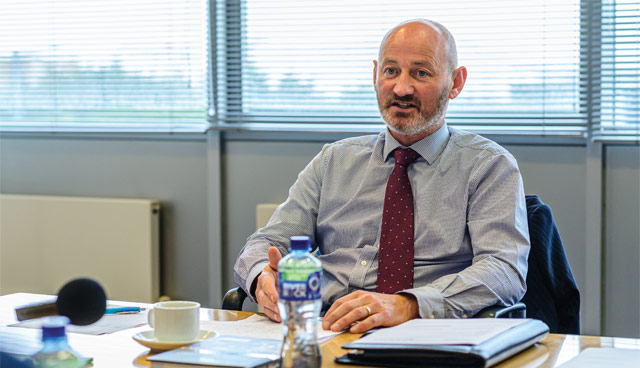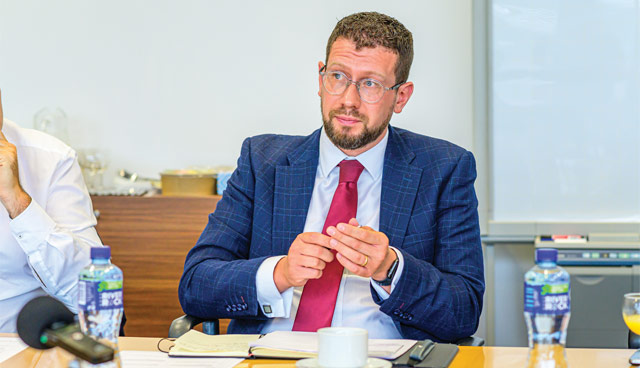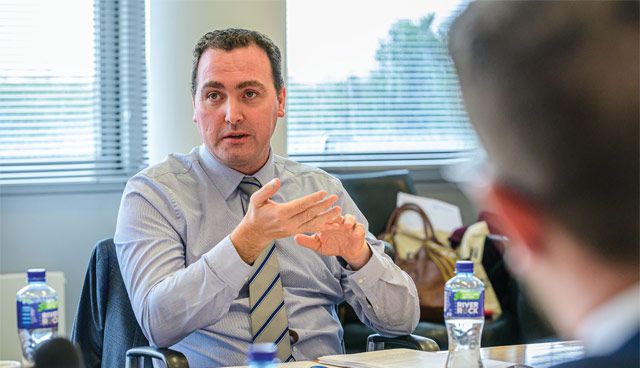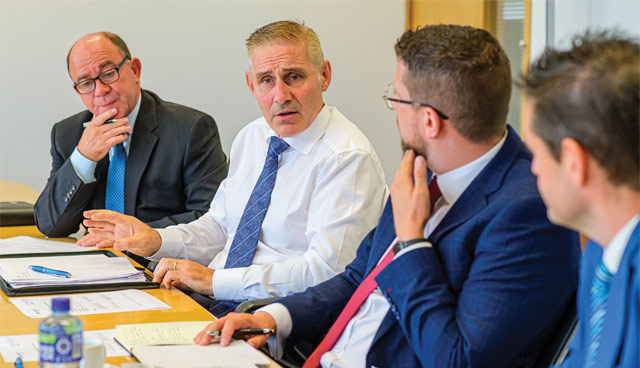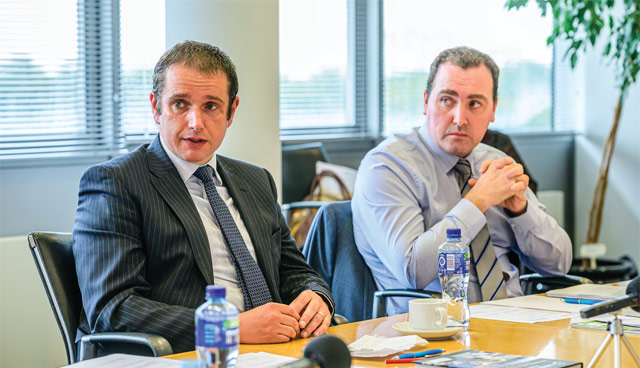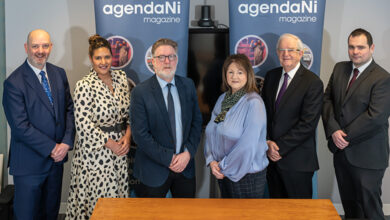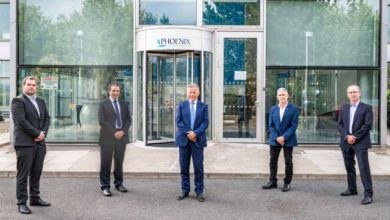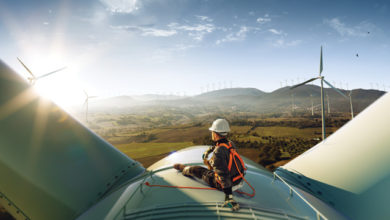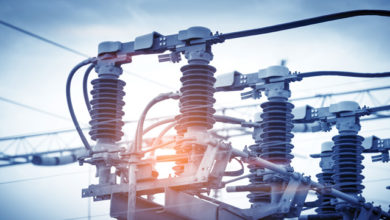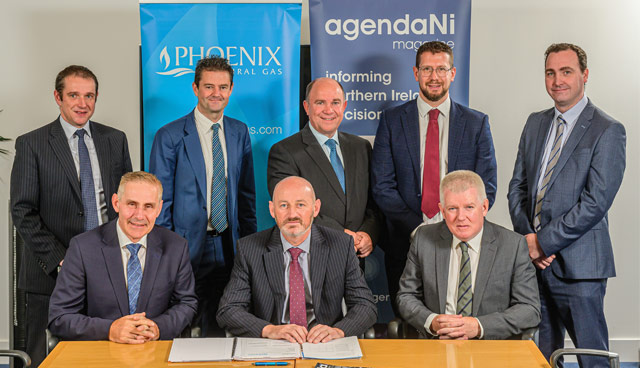
Phoenix hosted a round table discussion with key energy stakeholders on the future of the natural gas network and its role in Northern Ireland’s decarbonisation agenda.
What role has natural gas played in Northern Ireland’s environment, social and economic performance to date? Are there future growth opportunities for both natural gas connections and network expansion in Northern Ireland?
Ivan Bell
From 1996 natural gas has provided a fuel choice for customers in Northern Ireland. The network is still being expanded, fairly quickly, across Northern Ireland, to provide natural gas to over 550,000 properties and homes. As well as choice, it has delivered clear environmental benefits. We estimate that the industry has removed 12 million tonnes of carbon over the last 23 years and will continue to do so at a rate of one million tonnes annually.
John French
From a consumer perspective, we are strong advocates of natural gas and its offering of greater choice of how people heat their homes and greater flexibility in how they pay for that heat. Northern Ireland Housing Executive research shows that a household is less likely to be in fuel poverty if it has natural gas installed.
Brian Rankin
Gas, where it is available, has been our preference for at least the last decade and currently roughly around 70 per cent of our stock avails of natural gas. Typically, the urban need for social housing links well with the urban availability of gas and with a view on fuel poverty, budgeting and carbon emissions, natural gas is the best fit, for now.
Paul Stanfield
In the 12 years of firmus reaching 120,000 properties and making 40,000 connections to the network, I have never heard of anyone switching back from gas to oil, electric or solid fuel. It’s a solution to fuel poverty, but it’s also of great benefit to all residential customers in terms of running costs, lifestyle changes and its environmental impact.
Paddy Larkin
The switch to natural gas of Ballylumford power station in 1996 was the biggest step-change ever in Northern Ireland’s emissions. It wasn’t just the reduction of carbon emissions but also those of sulphur, which had a dramatic impact on air quality improvement. Since then innovations and improvements have been focussed on natural gas, such as the condensing boiler. Through our Gas to the West project, we have seen the impact gas is having on businesses deciding to increase investment, create jobs and build a future in areas simply because of their ability to connect to the gas network. However, demands from their customers to be more green are increasing and as a fossil fuel, there is still work to be done going forward.
I haven’t heard a net zero carbon for 2050 solution through electrification.
— Ivan Bell
David McKee
Natural gas has made a major contribution environmentally, particularly in relation to air quality and we shouldn’t overlook the flexibility and future potential of the fuel. In other countries it has infiltrated the transport sector and that’s where I see growth opportunities for Northern Ireland.
Richard Rodgers
The legislation states that the Department and the Utility Regulator are jointly responsible for the development of an efficient and economic natural gas industry and that has been the story for 23 years, but that still puts us more than 30 years behind GB. From a Northern Ireland perspective, our pipes are new, the network is still being extended, they’re plastic which means they will last a long time, so it’s important that we carry on gaining connections to the network, given the multiple benefits and in anticipation of the future. The challenge that exists is removing the C [carbon] from CH4 by 2050 and whether that’s through carbon capture and storage [CCS] or use of hydrogen gas directly; or whether the decision is that there is no future for the natural gas network. They are big decisions for the next 30 years, but they need to be discussed, starting today.
What additional role can natural gas play in decarbonisation through innovation and further utilisation?
David McKee
I don’t think you have to remove the C, it’s where it comes from that needs addressed. We can produce biomethane to 99 per cent purity. Biomethane is being injected into the grid infrastructure in mainland UK and in the south for use as electricity, heat and vehicle fuel, but not here. It’s not going to answer all of the questions but it’s a stepping stone towards renewable carbon.
Getting biomethane into the gas grid as quickly as possible should be a priority.
— David McKee
Paddy Larkin
Injecting biomethane into the network is a no brainer but the support mechanisms aren’t there yet. Relatively we have significantly more biogas producers than across the water but none of it is reaching the gas network. More needs to be done to support the production of biomethane, particularly from waste streams, but there are also limitations. We must be careful not to remove food-producing land or encourage the use of artificial fertiliser to produce biogas.
Ivan Bell
The crucial point is that it’s not a one or other scenario in solving the 2050 decarbonisation problem. Policies need to be put in place going forward that recognise that it’s a combination of all of our assets needed for net zero carbon 2050. Natural gas will play its role on an incremental basis. We don’t have all the answers today but it’s important that we don’t stand still and do nothing. Everyday we connect customers to the gas network, helping to solve the carbon problem, and we will keep doing that as we work to find a solution for 2050.
Paul Stanfield
Natural gas is the right solution for carbon reduction, available currently. In the industry, we have a lot of network in the ground and an accelerated connection policy would help drive carbon reduction, as would incentive to offset the financial constraints of switching from oil. We look forward to the integration of natural gas into the transport sector and the introduction of biomethane.
John French
Comparisons can’t be drawn directly with GB. In Northern Ireland 68 per cent of households are still using home heating oil compared to 70 per cent of GB using gas, so we are at different starting points. My concern is that mixed messages about the future energy fuel could stop people investing in the switch to gas currently.
Paddy Larkin
That is critical. I have yet to see a decarbonisation scenario that does not involve using natural gas and we should not be portraying a future where natural gas does not have a role. This is important, not just for consumers, but also for investors in natural gas infrastructure.
Brian Rankin
I think government need to be looking at future policy from a short, medium and long-term perspective. Yes, we have targets for 2050 but my fear would be that we jump the gun based on movements in GB and the Republic of Ireland around the likes of heat pumps, for example. We have to recognise the gap between the markets and not allow movements elsewhere to create uncertainty, which ultimately could lead to people not switching from carbon intensive fuels to natural gas.
What are key challenges in the adoption of low carbon technology and how should these be funded?
Paddy Larkin
The technology to decarbonise at a reasonable cost simply doesn’t exist or is currently unproven at scale. For example, nowhere in the world is Carbon capture and storage (CCS) working with conventional power generation.
Hydrogen is a potential decarbonisation route, but it needs CCS. Electrification technology does exist but the infrastructure needed to electrify transport and heat is enormous and the electricity storage problem has not been solved. The biomethane route appears sensible, so long as the product has the right grid quality but it has to be understood that there is a cost with it and it would need to be subsidised. Also, I see value in suppliers having an obligation to offer a renewable gas and electricity tariff to satisfy the customer demand to go green.
Our pipes are new, the network is still being extended, they’re plastic which means they will last a long time, so it’s important that we carry on gaining connections to the network.
— Richard Rodgers
Paul Stanfield
I understand that there are some 50 anaerobic digestion plants producing gas for electricity. However, it’s not being directly injected into the grid. There needs to be a process to lift that gas and get it into the system.
David McKee
We started that and on a daily basis we use the road infrastructure to mobilise our renewable gas for our industrial customers to produce electricity. It’s important that there is recognition that a key benefit going forward is the ability to inject it directly into the grid. Another area for greater exploration is the transport sector. We tend to focus on domestic and commercial solutions but as a major emitter, the transport sector offers huge potential for Northern Ireland make significant change.
Ivan Bell
In terms of the funding streams for low carbon technology, there is always a look to central government for incentive. The natural gas industry has regulated assets worth over £1 billion and I think the economic regulatory framework of those assets could contribute to solving some of the economic challenges. However, there would need to be flexibility to allow for investment in sub-economic areas, or opportunities that need a ‘kick-start’, and to spread those costs over the customer base that we already have. We have to move away from this idea that the only way of moving things forward is through central government incentives.
Consumer choice is important in all of this. Forcing a customer to do something through legislation is not the answer. So, whatever options we choose have to be attractive to the consumer and deliver on their demands.
Richard Rodgers
Reflecting on the electricity journey, we managed to hit the 40 per cent target because of the renewable obligation, which finds its way to customer bills. The first step was relatively painless but the next step to reach future targets is unlikely to be. The point about regulated assets is an important one. Part of the current pressure on electricity prices is the cost of enhancing the electricity grid to allow for more renewables on to the system. The gas asset itself, is pretty unleveraged. The concept of a natural gas network worth hundreds of millions of pounds being allowed additional investment at the margins is something that needs to be looked at, providing that investment is efficient and is delivering the outcomes that we need to lower the carbon footprint.
John French
It’s important to keep in mind the ‘who pays?’ concept. If only 16 to 20 per cent of consumers in Northern Ireland are on the gas network then they will bear the burden of that cost. We have to find a way to make it equitable across the whole consumer base.
Carbon reduction cannot be considered in isolation as there may be impacts in other areas such as fuel poverty.
— Brian Rankin
Brian Rankin
A key challenge is the longevity and sustainability of any approach. As housing associations, we can be perceived to be the guinea pig in terms of renewable technology installation, putting our own finances at risk. We need an approach that is going to last and that will have noticeable positive benefits for our customers.
Ivan Bell
Any approach needs joined up thinking across government. In transport, for example, we are seeing innovative projects from the likes of Translink but individual innovations in various sectors don’t always appear to join up.
David McKee
In Sweden, they have one municipality in charge of waste, transport, electricity etc. It means that decisions are taken centrally with a view on the bigger picture.
I have yet to see a decarbonisation scenario that does not involve using natural gas and we should not be portraying a future where natural gas does not have a role.
— Paddy Larkin
Richard Rodgers
The Department is committed to getting a call for evidence on a future energy strategy out this autumn. It’s important that we ask the right questions and also that we get quality evidence back from stakeholders and consumers, shaping the options we will lay out as part of a formal consultation next year. A plus for Northern Ireland is that energy policy is devolved. A negative is that we have had no government. With this in mind, we have established a cross-government steering group integrating all the relevant departments, who will each bring their own part of the energy jigsaw.
Hydrogen is seen by many industry commentators to be the key enabler for a net zero carbon future. What are the specific challenges and opportunities in the introduction of hydrogen?
Paul Stanfield
The opportunities are that we have an existing and expanding network that can take hydrogen with minor alteration. Domestic appliances already exist and are being further developed. The challenges are around the production and developing the most effective way of doing that.
Ivan Bell
A key thing is to remember that while we have devolved energy policy, a lot of what we do will be shaped by what ultimately will be injected in to the Scotland-Northern Ireland Pipeline (SNIP), so we have to stay in touch with GB policy. On the other hand, given our size relative to GB, we may need a tailored approach, that may not be 100 per cent hydrogen. We need to not rule anything out and keep pace with GB to ensure we can take any opportunity that arises. Given the 10-15 year lifespan of boilers, replacing them from 2035 onwards would still deliver a solution by 2050.
Hydrogen has challenges but there is a plan and there are obvious opportunities. I may be wrong but I haven’t heard a net zero carbon for 2050 solution through electrification.
The opportunities are that we have an existing and expanding network that can take hydrogen with minor alteration.
— Paul Stanfield
Paddy Larkin
Hydrogen is very much in its infancy and there are many obstacles to overcome. Its positives are that it is a gas and a network exists to mobilise it, it’s entirely green at the point of use and if used in conjunction with the electricity network can solve the storage problem. The downside is that hydrogen is currently not very efficient due to conversion losses. It’s important that we look and learn from those big pilot projects underway in GB and elsewhere. Current research is showing us that, in terms of heat, electrification and hydrogen are the only two solutions on the table. Both would need enormous cost commitments. We can’t fund both, so fairly soon, we need to take a decision.
Brian Rankin
From a research perspective it feels like electrification is the method that everyone is getting behind, probably because hydrogen appears to be further down the road. I think there is a challenge for academia and those with a vested interest in gas networks to explore hydrogen further.
Ivan Bell
There is a vast amount of work going on in that regard. Today there are more than 15 large projects in GB looking at hydrogen utilisation from production, to carbon capture and through to appliance development. That’s why it is important that we keep in touch with developments.
Looking at the future of the gas network, what one area should policy makers focus on to assist the decarbonisation of the network?
Paul Stanfield
Policy should focus on accelerating the conversion to natural gas because it’s the best answer available at this time and the network is flexible to future technologies. Also, I think there needs to be stricter regulation of the oil industry in terms of boiler installation.
Paddy Larkin
I believe that the installation of oil boilers, that do not meet gas level emissions standards, within the gas network should be banned. Boilers serve a 15-year life and from a particulate and CO2 perspective oil boilers mean unnecessary pollution in an area with access to gas.
David McKee
Getting biomethane into the gas grid as quickly as possible should be a priority. I also think a focus on transport fuel could put Northern Ireland ahead of its neighbours.
My concern is that mixed messages about the future energy fuel could stop people investing in the switch to gas currently.
— John French
Ivan Bell
I would like to see policy that creates the opportunities for the further extension of the gas network, with a more appropriate definition of economic and not the current one. We see no economic reason not to push to have the gas network available to 650,000 properties throughout Northern Ireland and solve more of the carbon problem while having a single network to support the solution, when we establish what that is.
John French
Consumers in Northern Ireland spend 20 per cent more than their GB counterparts to heat their homes, mainly because of the price of home heating oil, and that needs to be reduced. The way we see that being done is extending the gas network out further and giving people choice.
Brian Rankin
A cross-departmental policy approach is crucial to achieving outcomes. I would also advocate for a holistic, outcomes-based view on what we want to achieve and how we are going to get there. Carbon reduction cannot be considered in isolation as there may be impacts in other areas such as fuel poverty.
Richard Rodgers
Our strategic energy framework expires in 2020 and our next steps are fundamentally important. I am committed to proper engagement and I want informed debate. We need to future-proof our direction of travel and that will best happen with stakeholder input. It’s an exciting and complex time to be involved in energy.
Participants
Ivan Bell is Chief Operating Officer of Phoenix Natural Gas. He is a Chartered Engineer, Fellow of the Institution of Gas Engineers and Managers, Member of the Institution of Mechanical Engineers and Fellow of the Institute of Directors. Ivan is responsible for the Construction, Operation, Asset Management and Service Delivery aspects of the Gas Distribution Network, the provision of additional Customer Connections and the delivery of the company’s Health, Safety and Environmental policy, including the emergency services operation and Network Design and Planning.
John French joined The Consumer Council as Chief Executive on 1 July 2015. John graduated from the University of Dundee with an Honours and Masters degree in Accountancy and Business Finance. He has more than 15 years’ experience in policy, finance and regulation in Northern Ireland, GB and at an international level. He joined The Consumer Council from firmus energy where he was Director of Regulation and Pricing.
Paddy Larkin was appointed CEO of Mutual Energy Ltd in 2010, the company that now owns and operates the Moyle Electricity Interconnector, the SNIP, the Belfast Gas Pipeline and the ‘Gas to the West’ pipeline. He joined Mutual in 2007 as Executive Director and Managing Director for the Moyle Interconnector. Prior to this he was Chief Executive at Premier Power’s Ballylumford power station.
David McKee is CTO of the Granville Ecopark AD Facility in Dungannon and is Technical Director at NWP. He is a Chartered Chemical Engineer, with over 14 years’ experience in renewable energy products.
Brian Rankin leads the energy management team in Choice Housing. In 2018 he completed his MSc in Energy Management and Renewable Energy, with his dissertation examining new build energy standards. Brian has a BA Hons in Business Studies and has gained experience in areas such as heat networks and renewable technologies.
Richard Rodgers is Head of Energy, DfE, with over 30 years’ experience in the energy industry. He is a Strategic Advisor (Energy) at the Strategic Investment Board and is seconded into DfE. Richard was a non-executive director on the Board of the Utility Regulator for eight years (ending in March 2019) and previous roles include positions within British Gas, Phoenix and as Managing Director (international) at Eaga.
Paul Stanfield is Director of Sales, Marketing and Customer Services at firmus energy. A Civil Engineer, Paul joined the energy industry over 30 years’ ago. He has previously carried out marketing/technical and sales roles in the Coal Advisory Service, Mechanical contractors and Calor Gas. Over the last 22 years he has worked within the Northern Ireland Natural Gas Industry.

